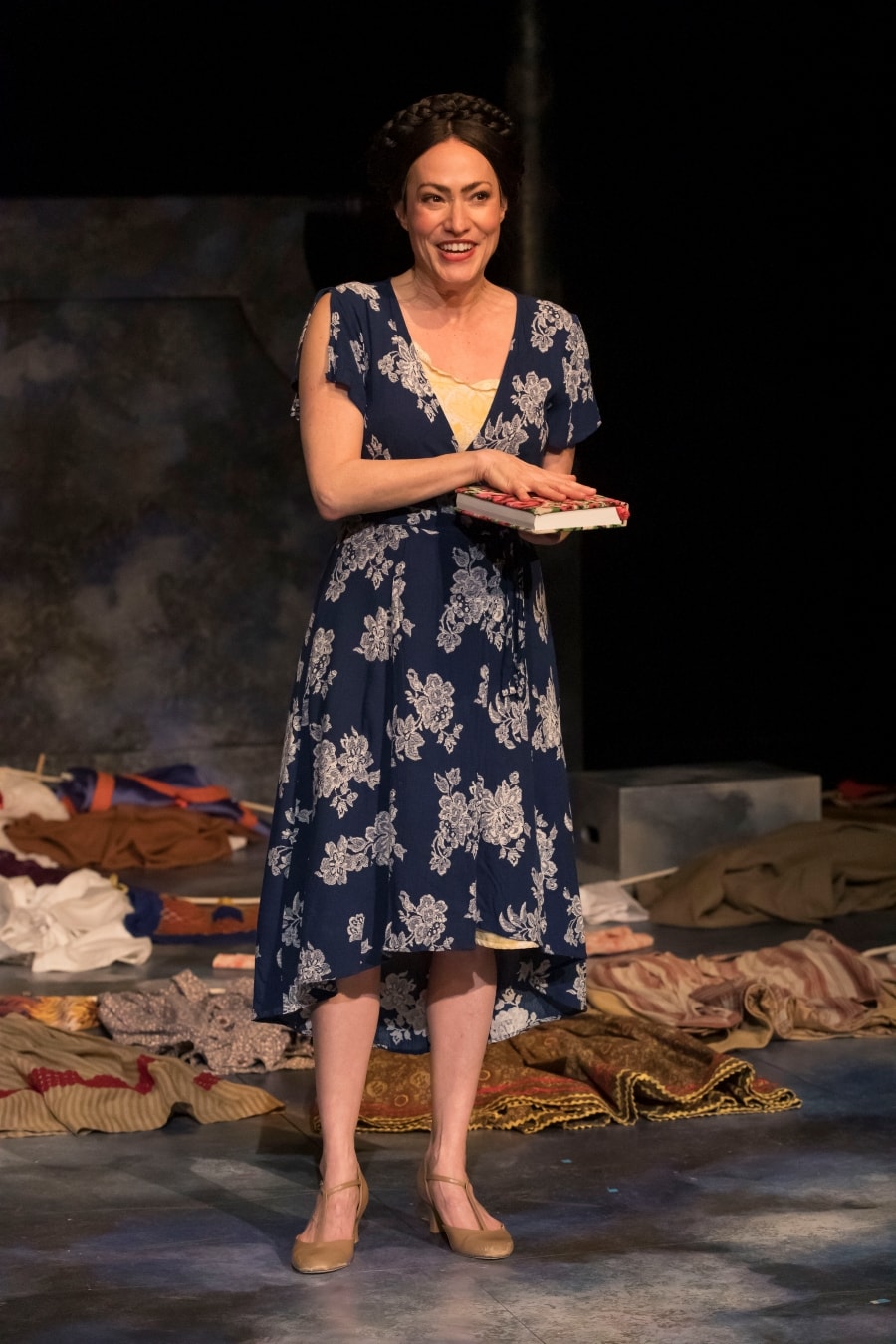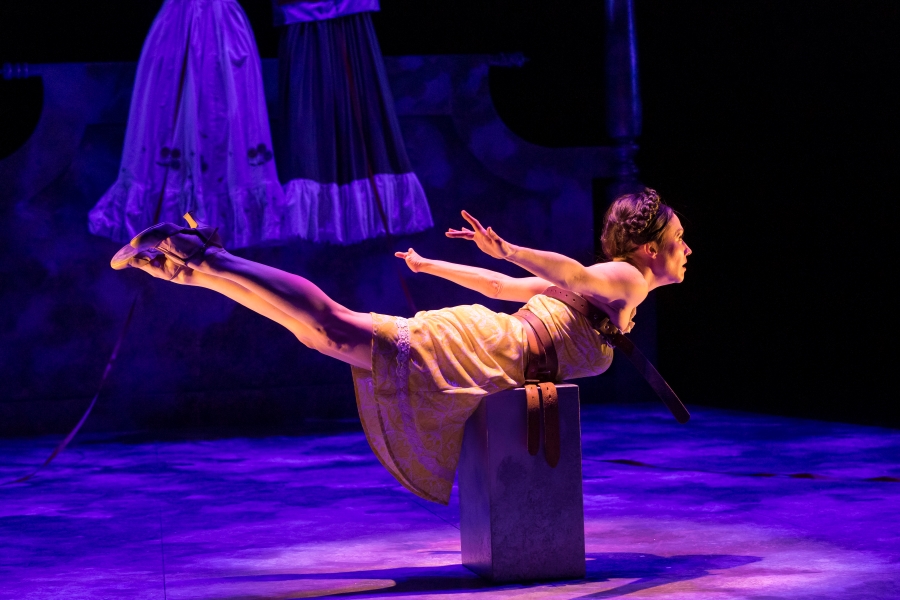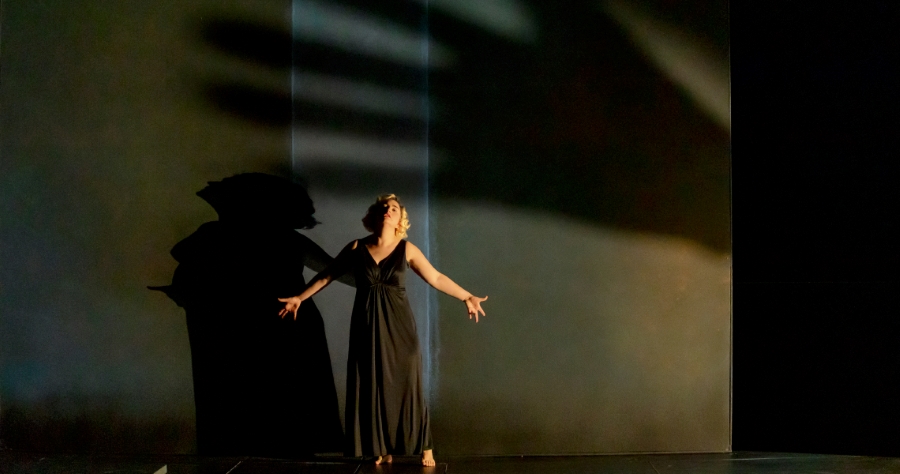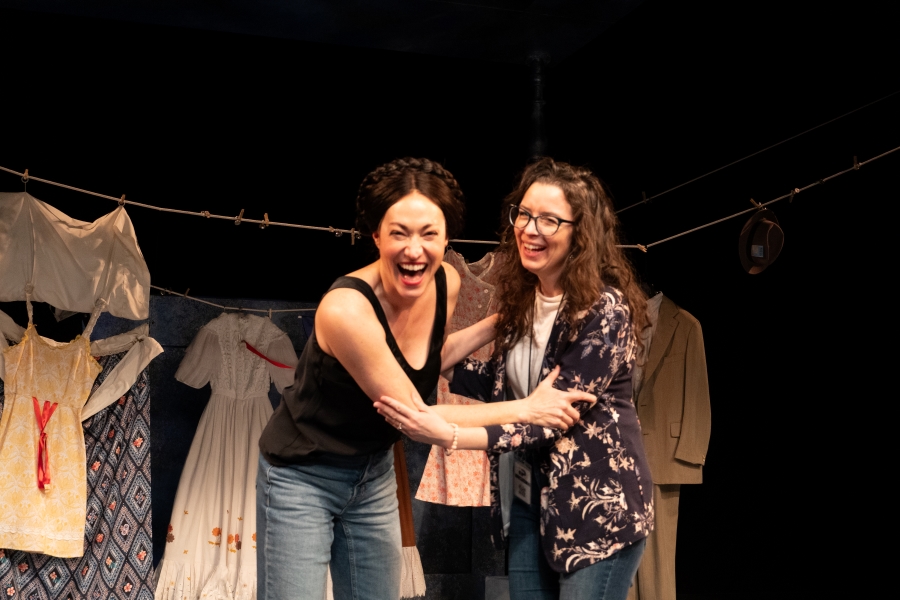Ahead of a 2016 production of Eric Rosen’s Lot’s Wife at Kansas City Rep, director Joanie Schultz and actor Vanessa Severo were brought in to do a workshop. Prior to this, Schultz and Severo hadn’t worked together, but as soon as they were in the room together for that three-day workshop, they instantly felt a special chemistry.
“Meeting Joanie was like—remember when you were a kid and you would go to the playground and there were kids running around, you didn’t know anybody, and you just went straight up to a kid and you were like, ‘Hey, want to play?’” Severo said in a recent interview. “That’s what it was like: making a friend instantly and playing without any boundaries. It was just fun, and there was no ceiling to it. It was just immediate.”

Schultz echoed a similar thought during a conversation I had with both artists earlier this month. She recalled walking into the room and thinking, “Oh my God, who are you?” Since then, their friendship and artistic partnership has blossomed. When KCRep expressed interest in Severo’s solo show Frida…A Self Portrait—a show that explores Frida Kahlo’s life on the eve of her death, written and performed by Severo, who opens a portal between her life as the daughter of Brazilian immigrants and the famed Mexican painter’s—she instantly knew she wanted Schultz to direct.
“She’s a collaborator, and I knew that it would be this exchange between the two of us that was fluid,” said Severo, who is also a choreographer and director. “She just started asking me the right questions, and the play evolved from there.”
The Schultz-directed 2019 world premiere production of Frida at KCRep (the culmination of Severo’s TCG Fox Fellowship) has since seen productions across the country, including a current run at Indiana Repertory Theatre (through April 7) and a recently announced upcoming production at Writer’s Theatre just outside of Chicago.
In addition to these continuing productions of Frida, the Schultz-Severo collaborations have only grown. The duo is coming off of a Cincinnati Playhouse in the Park world premiere of Dracula, written by Severo in collaboration with Schultz and co-directed by the two together. The new take on the familiar tale tells the story of Dracula from the perspective of the women in the story, characters typically pushed to the side in favor of their vampiric counterpart.
I had the chance to chat with Schultz and Severo about working on Frida, how their working relationship changed as they worked on Dracula, and their hopes for a future co-adapted version of A Christmas Carol. The following has been edited for length and clarity.
JERALD RAYMOND PIERCE: How has Frida grown over the years?
VANESSA SEVERO: I had written my shitty first draft of Frida in 2014, and I put it up at this little storefront theatre, which was very kind to me to experiment with that. But definitely it wasn’t finished, and I knew it wasn’t finished. It was 46 minutes long, the first version. When I brought Joanie on, she just started asking me the right questions, and the play evolved.
The big question was, “Well, why do you feel like you need to tell Frida’s story?” The truth of the matter was that in the first version, here I am telling this story about this Latina woman with a disability and queerness in the 1940s, which was verboten at the time. To find out that that’s in myself, and then to put myself in there to be able to share that chord with her—the play just completely changed. So it’s me lining up my life with Frida and seeing where the similarities are in there.
JOANIE SCHULTZ: The thing that makes Frida even more special is that Vanessa brings herself to it, and the way in which Vanessa brings herself to it. Since we did the Portland Center Stage production in 2021, which is probably the definitive production, it’s funny how much it’s changed and how much it hasn’t. Vanessa is an extremely consistent performer and leaves it all on the floor, as the kids say, every time she does it. So there’s a consistency to it, and yet she’s very alive in it every time. Every space we go to and every town feels a little different, but it’s always the same beautiful show.
What I say to people when we talk to theatres, and this is very true, is that people pre-buy tickets because they want to see this play about Frida Kahlo—but they come back. People come back two or three times, and they make their friends come because of Vanessa. Vanessa is so special, and the way in which she talks about herself in it is so special. She’s written and created a play that is actually hard to do, and you get to watch her do it and throw down every time.

What changed for you both as you moved from Frida to Dracula, which seems like it was a bit of a different working relationship?
VANESSA: It’s a big shift. We decided to go to a writer’s retreat to write Dracula in the middle of Colorado, with no distractions. What was interesting is that it came really quickly. It’s Dracula, but to be able to look through a different lens is what made it really exciting and why it happened very fast—because it’s not Bram Stoker’s Dracula, it’s our Dracula, through the female perspective. Women, typically in Dracula, were made to be objects or things; Dracula sucks their blood and discards them. And we’re like, “Well, what if we flipped it on its ear and made the women in charge, the ones on the chess board that are moving the men around as pawns?”
I think what happened is, we realized we communicate really openly with each other. There’s no ego involved, it’s just all out there on the table. That’s what made creating Dracula really exciting for me, and within seven days, we had our shitty first draft.
JOANIE: In some ways, in a matter of degrees, it was the same and different from Frida, where I asked a lot of questions. I think I was more involved in the writing of Dracula, but I think that we work in the same way. We come at things from a really different direction. When we were co-directing, Vanessa thinks beautifully visually; she just can see exactly what should happen next. I come at it from a different direction, with a lot of questions.
VANESSA: She really dramaturgically knows what it needs to be linearly, and I’m a very visual person. I’m movement-based. I just put it on its feet, and then we find out where the placement is.
JOANIE: I directed Frida, but there’s all this movement in it. Sometimes people are like, “That moment was great,” and I’m like, “That’s not me, that’s her. She has movement-directed herself.” On both of these projects, the thing that I have found is: If it feels like you’re making plays in your backyard with your friends as a kid, which is what I used to love doing, then you’re doing it right. We’re always playing.
What advice would you give to other artists who may be looking for that kind of collaborator?
VANESSA: I would say that taking your ego out of it is the first step, and just being open to trying things. It’s so simple, I feel like. To find that collaborative person, you have to make sure that you both are in love with the thing that you’re doing and be open to trying all the things on the buffet instead of having one idea.
JOANIE: I think that you also have to, without ego, believe in your own ideas enough to bring them to the table. Then also, if they don’t work, be open to that too. It’s never a matter of whether an idea is bad or good. It’s whether it works in this moment or it doesn’t work in this moment.
VANESSA: The important thing to always keep in mind when you’re collaborating with somebody is: What’s the best thing to tell this story? So it’s not a “good” or a “bad” idea, it’s what the story needs. I know when I was early career, I was like, “How do I make it? How do I do the thing? How do I make this happen?” I always hated the answer that everybody gave me, but it’s the one that’s the most true, which is: You just have to do the art that you want to make, then the right people come into your life who also want to make that kind of art. Then that’s what you get to do instead of jobbing it, because none of us are going to get rich doing this. Maybe three people will. But if you’re doing what you love and working with people you love, then go toward that.




Are there any bits from each other that you each carry with you in your separate artistic work? Like, is there a little Joanie in the back of your head, Vanessa? Or a little Vanessa that you take into your work, Joanie?
VANESSA: Joanie told me this thing, and it’s always stuck with me. It was given to you by another director, but I like to always think about it when I’m creating. It’s something like: If you think of something like, “This person is strict and laser-focused and can’t be bendable,” then Joanie says, “Yes, and the opposite is also true.” I always like to think of that: The opposite is also true. So what’s the other side? That works for acting, it works in directing, it works in movement. It’s like, well, what’s the opposite of that? Because there’s truth in both.
JOANIE: It’s a Frank Galati quote. I have moments now when I’m directing other things that I really do think “WWVD”—What Would Vanessa Do—especially when I’m looking at the composition onstage. I think Vanessa makes the most beautiful pictures, and it’s not my strong point. It’s always happenstance for me. So I try to think about that now and take a step back and look at the stage. “What is this picture?” Which I didn’t used to do very consciously. WWVD!
VANESSA: I didn’t know that.
JOANIE: I know. I was revealed in this American Theatre interview.
Tell me about where the idea to co-adapt A Christmas Carol came from. Can you tease what you’re up to there?
VANESSA: It happened in the pandemic. We were all going crazy, and we were talking on the phone. We were like, “We need a Christmas Carol that’s bare bones and people doing Foley sounds.” And then we gave ourselves a deadline, right?
JOANIE: We wrote a first draft in a week.
VANESSA: I remember, I closed myself off in my room. I didn’t let the cat in. I didn’t let my daughter in. I was like, “I’m writing a Christmas Carol.” And we would take turns writing. It came out in a week, and it needs to be revisited, I would say.
JOANIE: It does.
VANESSA: We’re waiting for the right theatre to come along! Also, I just keep bugging her about it—no pun intended—but I have another unfinished play called Advice From a Spider, which is a dark children’s fable. You know how we used to learn our lessons from fables, and now Disney makes everything okay? They used to be about like, “Hey, and then you could lose your feet,” whatever that story was. I’ve been working on that off and on for years. Those are all the things on the buffet.

That makes me wonder, for both of you: How are you choosing what you want to work on? Are there specific aspects of the art that you’re trying to explore?
JOANIE: I think it’s the thing that just puts a fire underneath us, right?
VANESSA: I think so. We’re both really interested in what makes theatre theatre, and making—I hate this word because it feels like it’s not describing theatre—really theatrical theatre productions. In Dracula we worked with an illusionist. We were really interested in old-school magic. People kept saying in production, “Are you going to use projections?” And we were like, “No.” We wanted all of that old-school magic of just shadow work, things that are super effective and terrifying, and the reason that we go to live theatre and not to a movie. We wanted to pull away from things that I feel like a lot of theatres are leaning into, which can be effective for them—but I love the theatricality of going into something where you’re like, “How did that chair just move?” And it’s so simple, a simple magic trick that is self-contained and actor-driven. Those are the things we go home and talk about in the car.
JOANIE: The content is a different thing, I think. It is the thing that just happens to hit our fancy, for whatever reason, at that moment. Obviously, Vanessa’s love for Frida, she brought that to me, and then I became obsessed with Frida Kahlo. Dracula was a whole different thing, because part of it was my position at Cincinnati Playhouse [as associate artistic director]. We were talking about Dracula, and we just really thought that we could take a stab at it, no pun intended. It was just time for a new adaptation and we wanted to see what that would look like. And not one that’s jokey, because it can slip so quickly into the farcical What We Do in the Shadows, all of that. How do you keep it what it’s intended to be, which is a suspense thriller and a psychological thriller? That’s really the heart of it—that it’s not actually about this guy sucking blood. It’s about how all these people are moving about in their lives and why we make the choices that we do, and why we hide the things that we do in order to get the things that we want.
To wrap up, I’d love to know your hopes as you look toward the future of theatre. What are your dreams for this industry and art form?
JOANIE: Wow, so many things. We’re in such a complicated time. I just hope that we can all really keep delving into what makes theatre theatre and give people a reason to come, because it’s different than things that we watch on screens. And I hope that people get excited about that live experience and start coming out even more again to live theatre.
VANESSA: I’m hoping that we start seeing more plays where people have a lot more discussion about it afterward. I feel like we’ve tipped in a frightening way towards things that are a little too safe at times. I would like theatre to start raising the question again—what it’s supposed to do is hold up the mirror, right? And we go, “Well, do I do that?” and “Do I say those things?” Question ourselves, always questioning, which is what we’re supposed to be doing. I hope that we go more in that direction, because that’s what it’s intended to be, evaluating ourselves and living our life through story. We’re all in our own story.
I would like to go to a heavy discussion topic where people drive home and there’s opposing views. I want that. It was fun to watch in the lobbies after Dracula. People were like, “Wait, what was that? What did she do?” I love seeing people in deep discussion when they leave the theatre.
JOANIE: The kind that sticks with you. Some of our board members have been like, “I can’t stop thinking about it.” I’m like, “Yes.”
Jerald Raymond Pierce (he/him) is the Chicago editor for American Theatre. jpierce@tcg.org


